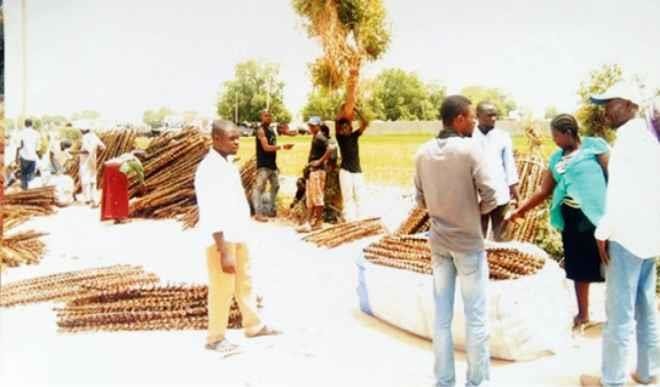Why frog business dwindles in Hadejia
Business of frogs is one of the past growing business in Hadejia fish market for many years, Chronicle, learnt. However, the business suffers a set back in recent years following the scarcity of the amphibian and economic hardship affecting patronisers of the business. Chronicle findings at the market indicated that about half of the buyers […]

Business of frogs is one of the past growing business in Hadejia fish market for many years, Chronicle, learnt.
However, the business suffers a set back in recent years following the scarcity of the amphibian and economic hardship affecting patronisers of the business.
Chronicle findings at the market indicated that about half of the buyers that originally patronise the market from other states across the country, are no longer coming to the area for the business.
As alien as frog business is in the north, it thrives in Hadejia fish market following discovery of the business as a money spinning venture.
In this season of the year, the frogs are usually scarce, hence, they are difficult to be hunted and that grossly affected the level of supply to the market.
Hitherto, frog is only considered as one of the amphibians that are commonly found in the north but without any economic importance.
The business of frog was introduced to Hadejia community by some ethnic groups from the middle belt and southern part of the country, who originally come to the state for fish business but in the process discovered that Hadejia is endowed with the type of frogs that have a bigger market in their various localities.
Tivs from Benue state are the major ethnic group among the patronisers of Hadejia fish market. They usually come to the market in large number but upon the discovering the availability of the type of frog that is needed in their local markets, they started hunting for the frog and selling same to their fellow tribes men who come to Hadejia for fish business.
As the frog business boomed, following increased in supply and influx of buyers, natives of Hadejia town also saw the discovery as an opportunity for them to key into the business with a view to making fortune out of it.
The business, Chronicle gathered, did not come into being without some elements of stigmatisation especially among the host community. It was said that most of the natives that opted for the business were shown some level of stigmatisation by people who consider the business as alien.
Frog merchants were chased out from the fish market leading to their relocation to Gidan-Gona area, the unwholesome treatment made the business so unattractive to the natives.
Search for a better accommodation for their business, took the frog merchants to the premises of Hadejia/Jamare River Basin Authority site otherwise referred to as Gidan-Gona.
Our reporter observed that although both male and female gender patronise the market but women constitute the majority, especially among the buyers as many of them prefer dealing in frog than fish considering its demand back home in Benue state.
Ibrahim Alluwa, was one of the pioneers among the natives of Hadejia that embraced the new business after the Tivs sought for his intervention for the purpose of introducing the trade in the area.
Narrating his experience at the beginning of the business, Alluwa said, Tivs agitated for a frog market in the Hadejia when they realised the potentials to feed their local market back home.
He said even his family was not spared as they also suffered from stigmatisation, adding that his children were called names in schools and public places.
“The biggest challenge we had at the time of establishing the market was how to convince the muslim community around the area to accept their plan because the new market will be situated between Gidan-Gona and a Jumma’at Mosque.”
He said as frog business dwindled, only about 70 buyers patronise the market on Sunday as against the 150 to 300 merchants that hitherto visited the market weekly.
He added that a buyer that in the past could buy 600 sticks of smoked frog but now buys only half of such and that for those that buy in cartons also buy less compared to what they used to buy.
Another native of Hadejia, who is also parting in the business, Aliyu Bello said, “In the past about five trucks and many small buses that usually supply frogs to many states, are no longer coming to the market.
Only two or three trucks now supply frog to other states from this market in these days.
“Most of our customers hardly come to the market these days as they always complain of lack of money. Economic crunch is greatly affecting our customers. More than half of them have stopped coming to the market now.
“The supply of frog to the market has also gone down, thereby affecting the flow of the business in the market. At season like this, hunting of frog is increasingly becoming difficult by the day as the amphibian is also becoming scarce by the day.”
The Chairperson of frog buyers, Mrs Cecilia Kure, told our reporter that there were individual customers that buy frogs as much as N600,000 at Hadejia frog market, saying Smoke Stick frog was the most patronised amphibian by the buyers who were mostly women.
In each stick, there are about 50 pieces of smoked frogs and that buyers went for the smoke stick frog because that is what their customers preferred.
“Over eight, 18 seater buses with full load of smoked frog leave Hadejia market every Sunday to Benue state. Although, it is not only the frog that we purchase but also buy smoked fish and bush meat.
“I buy about 200 sticks of smoked frogs every week. Depending on ones capital, some buy as much as that of N600,000. In Benue state we supply Gboko town and environ.”
